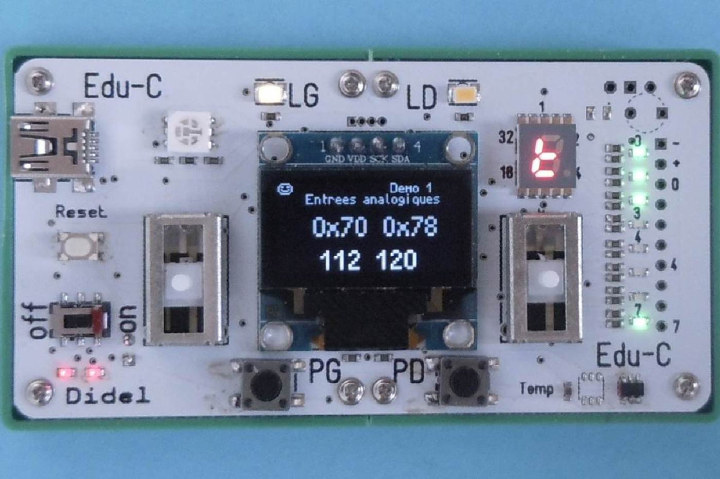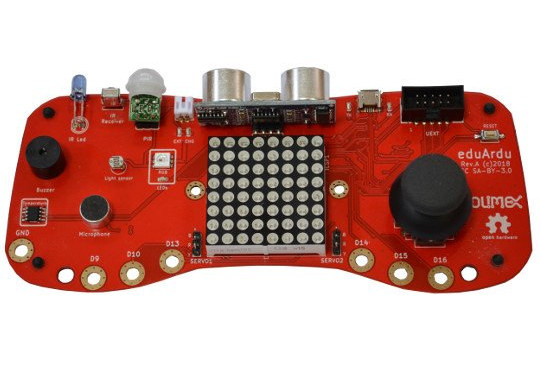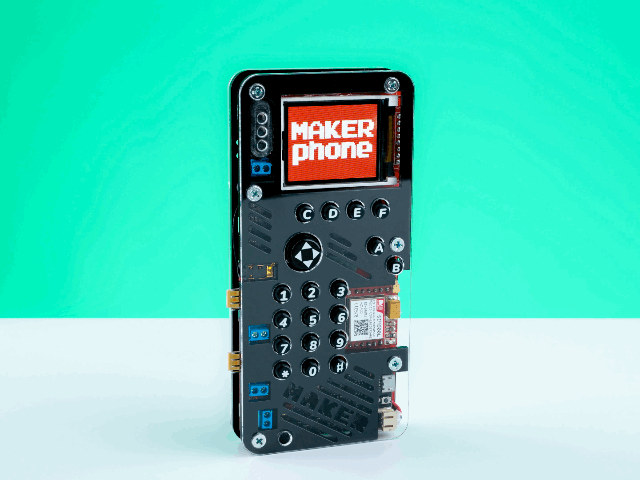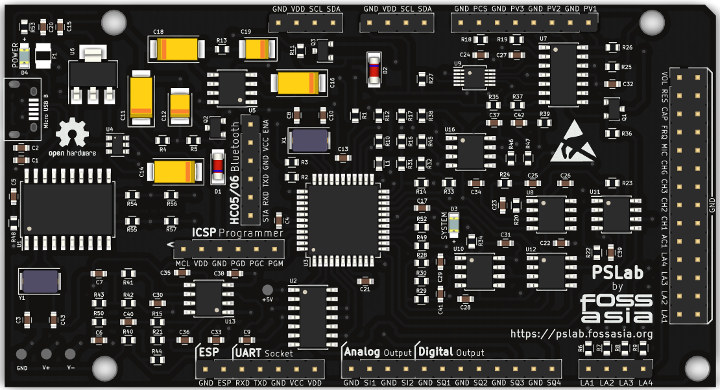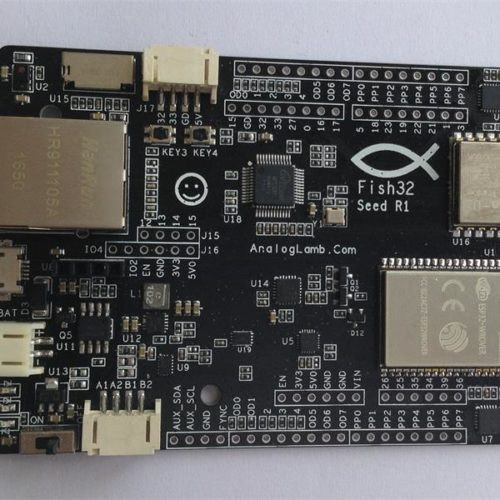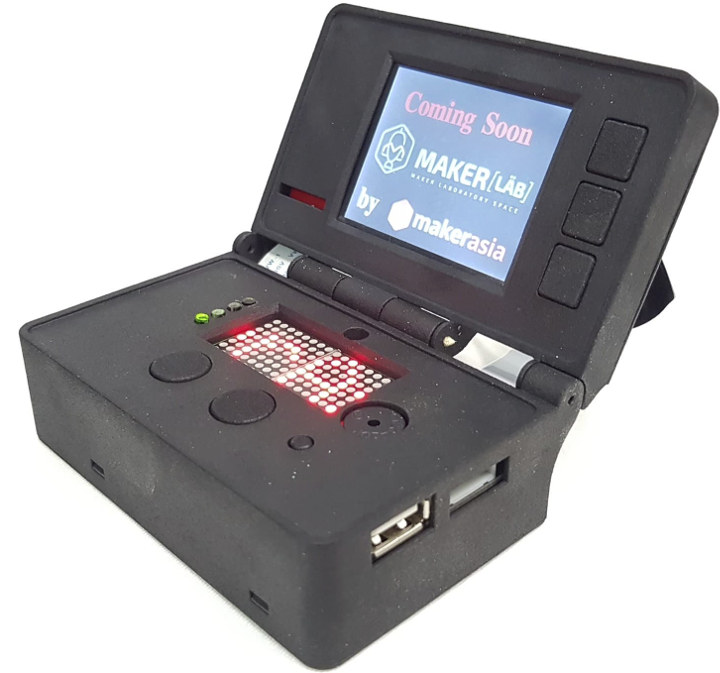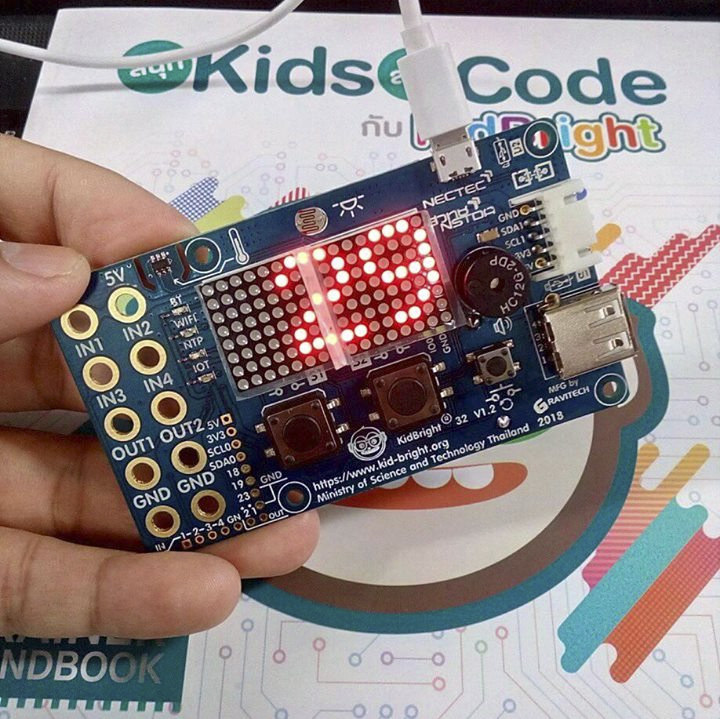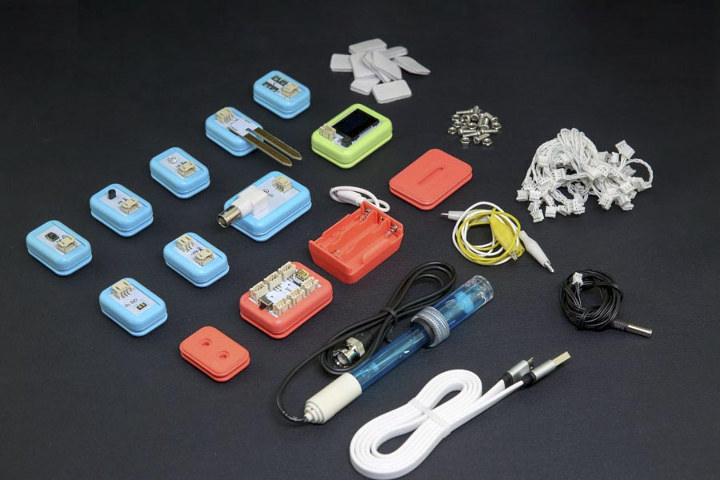Sometimes learning can be boring, and a potentially good way to get kids more engaged is to learn by playing. Edu-C Arduino compatible board is designed to teach game development to kids old and young, so they have a lasting reward once they complete programming of the board, or they may decide to customize the game further. Edu-C hardware specifications: MCU – Microchip Atmel AVR328 microcontroller Display – 28×64 pixel OLED display + 1-digita 7-segment display Game Inputs – Left and right potentiometers Misc – 8x LEDs, left & right LEDs, RGB LED, on/off power switch, reset button, buzzer USB – 1x micro USB connector for programming (CH340) and power Power Supply – 5V via USB; LiPo battery support The board ships with a 200 mAh Lipo battery, and a charger. Educational materials are also provided, but only in French right now, except for some documents which are in English. There […]
eduArdu is an Open Source Hardware Arduino Learning Board
Olimex has recently launched eduArdu, an open source hardware Arduino compatible board specifically designed for education with plenty of buttons, LEDs, and sensors, as well as tutorials and samples source code to help young and older aspiring makers get started with Arduino programming. eduArdu hardware specifications: MCU – Microchip ATMega32U4 AVR microcontroller (as used in Arduino Leonardo) Display – 8×8 LED matrix display Audio – Built-in microphone, buzzer User Inputs – Joystick with push button, 6 Maykey-Makey type buttons Sensors – Utrasound distance sensor, light sensor, PIR sensor, temperature sensor (-45 to +125C) Expansion Two servo motor connectors UEXT connector Debugging / Programming – 1x micro USB port Misc – RGB LED, IR transmitter, IR receiver, status LED, reset button Power Supply LiPo charger and battery connector 5V via USB port Dimensions – 170 x 75 mm Programming can be done with the Arduino IDE, or Snap4Arduino visual programming IDE. […]
$94 MAKERphone DIY Mobile Phone Supports MicroPython, Arduino IDE, and Scratch (Crowdfunding)
If you ever wanted to buy a mobile phone that you can assemble yourself, RePhone Kit Ctreate going for $59 is a nice option, but in truth it does not exactly look like your typical phone with its almost square shape. It’s also good to have more option, that’s exactly what MAKERphone is offering with a DIY mobile phone targeting the educational market. Beside the educational value of the assembly also involving some soldering skills depending on the selected kit, kids will be able to learn to program the phone with MicroPython, the Arduino IDE (C language), and/or Scratch visual programming. MAKERphone kit content and specifications: MAKERphone circuit board with 8x user LEDs for backlight (and special effects), 4-way mechanical joystick, 12-button numeric keypad, A, B, C, D, E, and F buttons, DS3231 RTC chip, vibrator… Main microcomputer module based on Espressif Systems ESP32 WiSoC with 802.11 b/g/n WiFi, Bluetooth […]
Pocket Science Lab (PSLab) is an Open Source Hardware Electronics Lab
Last Saturday I created a virtual schedule for the Embedded Linux Conference Europe 2018 where I listed some of the sessions relevant to myself and hopefully regular readers of CNX Software, but due to scheduling conflicts one talk did not make it to the list: “Pocket Science Lab – An Open Source Hardware for Electronics Teaching & Learning” by FOSSASIA. The project is also referred to as PSLab, and aims to “create an Open Source hardware device that can be used for experiments by teachers, students, and citizen scientists to learn and teach electronics”. It looks interesting enough so let’s have a closer look. The project is inspired by the earlier expEYES project that combines with Raspberry Pi or other Linux platform to create an electronic labs, and the work by the Open Science Hardware community. PSLab key features and specifications: MCU – Microchip PIC24EP256GP204 16-bit microcontroller @ up to […]
$50 Fish32 Seed “Education” ESP32 Board Comes with Plenty of I/Os, Sensors, and Connectivity Options
Sometimes I feel the word “Education” is sometimes thrown around for marketing purpose, and AnalogLamb Fish32 Seed board for “ESP32 Community Education Board” feels that way to me as so far, I could not see any tutorials or other teaching/ learning resources for the board. Having said that I can see why it could be potentially used for education: the sheer number of features, sensors, and connectivity options should allow students to learn to program my different components around ESP32. It’s just at this stage it may not be such an easy platform to learn on. Fish32 Seed board specifications: Supported ESP32 Modules – ESP32-WROVER, ALB32-WROVER, ESP32-WROOM-32 Connectivity 802.11 b/g/n WiFi and Bluetooth 4.2 via ESP32 10/100M Ethernet (RJ45) via WIZnet W5500 chip with support for up to 8 independent sockets LoRa via SX1278 chip (433 MHz) Sensors NXP MPU-9250 with 3-axis MEMS gyroscope, 3-axis MEMS accelerometer, 3-axis MEMS magnetometer […]
MakerAsia KBX is a Cool Extension Case for KidBright ESP32 Board
Last week, I wrote about KidBright32, an ESP32 board aiming to teach STEM to students in Thailand, a bit like BBC Micro:bit but with more advanced features, and all KidBright training course and tutorial in Thai language. The project also been partnering with MakerAsia to create a cool-looking extension enclosure for the board calld KBX (KidBright Extension) with display, USB, I/O ports etc… MakerAsia KBX case specifications: TFT Display with Touch USB OTG port with support for Keyboard and JoyStick SD Card slot I/O Extension port with support for I2C, SPI, UART/PGM, and 15 GPIO’s Various buttons and LEDs The two LED dot Matrix displays, plus buttons, LEDs, and + buzzer around are already part of KidBright32 board. It’s unclear whether a battery is included in the kit, or you can somehow fit one inside, as the photos show a micro USB cable connected to the box. They also appears […]
KidBright32 Board is Thailand’s BBC Micro:Bit Equivalent
BBC Micro:Bit board was first announced in July 2015. Designed for STEM education, the board was then offered to UK schools in March 2016, and a few months later UK store would start selling it worldwide. It’s now available pretty much anywhere, and you can likely find it in a local store or online. The Thai government must have seen this, and thought to themselves “If the British can do it, we can do it too!”, as the National Electronics and Computer Technology Center (NECTEC) part of Thailand’s Ministry of Science and Technology designed KidBright32 board and courses to teach STEM to Thai students. The board is based on Espressif Systems ESP32-WROOM-32 WiFI and Bluetooth module, and comes with large holes for power (5V/GND) and 6 digital inputs/outputs, smaller through holes for I2C and more I/Os, as well as an I2C header. We’ll also find some LEDs, two dot matrix […]
BOSON Kits Feature LEGO Compatible Building Blocks for STEM Education
Last year, DFRobot successfully introduced BOSON Kit “Powerful Building Blocks For LEGO STEM”via Kickstarter, and I’ve just noticed the company is now selling two BOSON Kits on their website: BOSON Science Kit for $149 BOSON Inventor Kit for $249 The kits are plug and pay and do not require coding, nor soldering. The modules come with built-in magnets, or they can be attached with screws, Velcro or to LEGO parts. BOSON modules are based on Intel Curie BLE modules, but those are being phased out, so you may want to inquire DFRobot if long term availability / appropriate stock is a concern. BOSON Science Kit As its name gives away, the kit is a set of exploration tool for aspiring young scientist with the following items: 8 scientific sensors for physics, chemistry and biology: Light sensor Humidity sensor Soil moisture sensor Temperature sensor Waterproof temperature sensor pH sensor (That’s the […]


